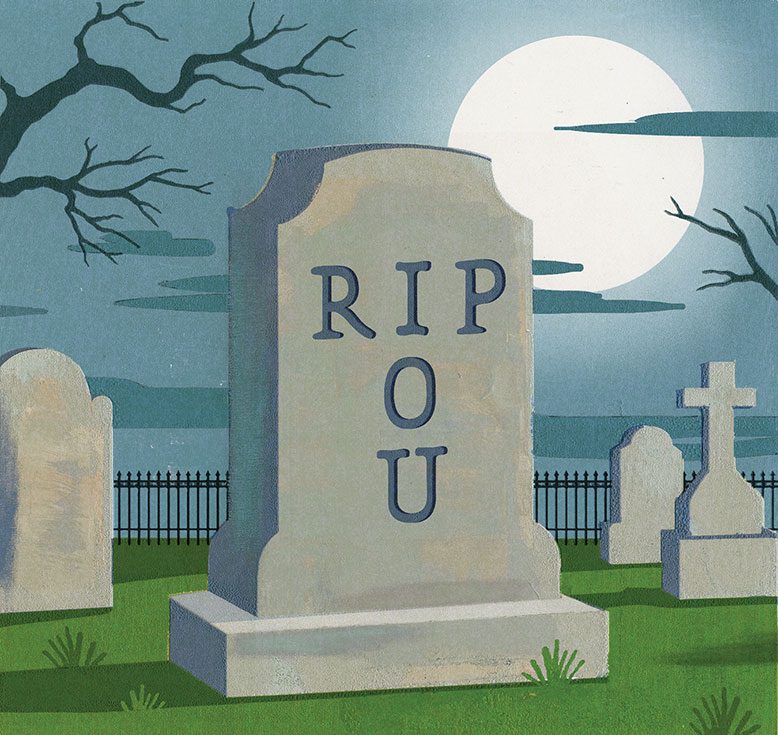
If you think it’s expensive to live in New Jersey, try dying here. New Jersey is one of two states in the nation—the other being Maryland—to have two so-called death taxes: the estate tax and the inheritance tax. The estate tax is based on the value of a person’s assets at death; the inheritance tax is based on who receives the assets. (Good news: In New Jersey, surviving spouses, children and grandchildren are exempt from the inheritance tax.)
Many contend that older New Jerseyans abandon our state for places that are more estate friendly. To reverse this presumed trend, Governor Chris Christie and many of his fellow Republicans in Trenton are calling for an immediate end to the estate tax.
Those opposed to the idea ask, with the budget gap as big as it is, and another massive pension payment looming, how could our state give up the approximately $441 million derived from the estate tax? Good question—but if affluent people continue to leave our state, won’t we keep collecting less and less in estate taxes?
Who said tax policy was easy?
“The estate tax isn’t just something that affects the wealthy,” said Christie in his recent State of the State address. “It’s penalizing middle-class families who want to pass down the family home to the next generation…. Our tax structure incentivizes people to move to other states as they age.” Christie continued, “We also have the lowest exemption threshold in the country. It makes New Jersey unfair and uncompetitive.”
Indeed, the estate-tax exemption threshold in New Jersey is $675,000, compared to the federal exemption level of about $5.4 million. That means if you die in New Jersey and your estate is greater than $675,000, it will be taxed. But in New Jersey, with our high cost of living, a $675,000 estate is hardly the sign of great affluence. (In neighboring New York State, the estate tax exemption level will climb to $4.18 million in April; Pennsylvania has an inheritance tax but no estate tax.)
Assembly Speaker Vincent Prieto, a Democrat, says he might be comfortable with a bill phasing out the estate tax. “We would need to do that slowly over a three- or four-year period so the economy catches up and we can plug that $441 million hole,” says Prieto. “It’s about compromise and giving these individuals the comfort level that, in New Jersey, you can leave your estate and it won’t be taxed too bad.”
On the other hand, Jon Bramnick, the Republican leader in the Assembly, says we need to immediately eliminate the estate tax to bring New Jersey in line with other states.
“Surveys say that we are losing hundreds of millionaires,” says Bramnick. “It is too expensive to die in the state and too expensive to do business here. We have a state income tax that can be as high as 10 percent, where other states have no state income tax. If you have a family business, and you move to 48 other states, the estate and inheritance taxes are either less or nonexistent. That is just one example of the high taxes we have in the state that force people to move.”
There is a strong case for a phase-out of the estate tax, if not its immediate elimination. At the same time, Trenton must address how we will make up the lost revenue in the short term. While one deal won’t relieve the high cost of living in New Jersey, at least dying might be a little easier to swallow.

Steve–you were interviewed by Metro Focus 2/22/16. You were asked to explain the NJ inheritance tax. You barely whispered a word about it, and only said: “family and charities don’t pay; everyone else does. Your answer was WRONG. You talked mostly about the NJ estate tax (as you did above) a tax I’m guessing will adversly affect you–so you have a vested interest/a stake in its repeal—as I imagine does Gov Christie and the NJ legislators who have been vocal on the repeal of the NJ estate tax — and who bury/do not discuss/hide from the public view – the NJ inheritance tax. You happily wrote that the family members you named above don’t pay NJ inheritance tax. Correct. (I ASSUME you’re so happy because YOU HAVE such CLASS A LINEAL HEIRS TO LEAVE YOUR MONEY TO–as does Gov Christie and the NJ legislators who have been vocal on this matter ). You (and they) NEGLECT to state all the BAD NEWS about the NJ inheritance tax; that if you DON’T have lineal family members–this tax kicks in starting at just $500 bucks (not $675,000 as afforded by today’s NJ estate tax–a “privilege” tax and not ever is abolished all-together. The NJ inheritance tax kicks in today and will kick in tomorrow (if not repealed) whether you die with $600 bucks (class-warfare) or $6 million. The NJ inheritance tax is discriminatory toward NJ descendants and their heirs. Only 6 states have this discriminatory law. The majority of the people in the U.S have spoken–they got rid of this tax. There’s more for the reader to know about concerning the horrific things surrounding the NJ inheritance tax. This tax is hidden from the public view by the Gov, by vocal legislators who will BENEFIT from the repeal of the NJ estate tax. As such, willfully burying all thorough discussion of the NJ inheritance tax and what we should do. ALL should recuse themselves from participating in the legislative process on this matter. You? You’re in the education business. This article has an agenda and is not educational about what these two taxes are, what they do, who they affect, etc. I can rip it apart with my teeth. Read what I write and learn.